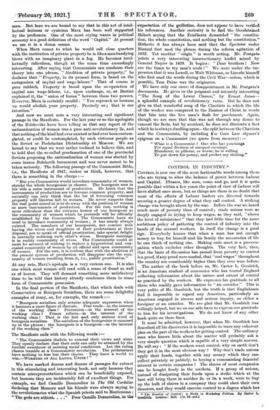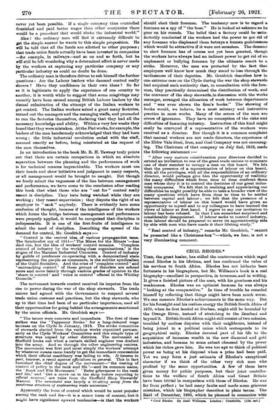CONTROL IN INDUSTRY.* Coa.rrsoe is now one of the most
fashionable words among those who are trying to alter the balance of power between Labour and Capital. Phrases, like men, come and go, and it is quite possible that within a few years the point of view of Labour will have shifted once more, but as things are there is no doubt that most of the efforts of Labour leaders are directed towards securing a greater degree of what they call control. A striking change was brought about by the war. Before the war we heard
much more of poverty than of control ; trade unions were so deeply engaged in trying to keep wages, as they said, " above the level of subsistence " that they had little time for the more ambitious policy of gathering the control of industry into the hands of the manual workers. In itself the change is a good sign. Everybody knows that when a man has not enough money to buy for himself and his family the necessaries of life he can think of nothing else. Making ends meet is a preoccu- pation which excludes other thoughts. The very fact, then, that the basis of discussion has passed from poverty to control is a proof, if any proof were needed, that "real wages" throughout the country are considerably higher than they over were before.
The author of the book before us, Mr. Carter L. Goodrich, is an American student of economics who has toured England collecting information about the nature and extent of control as practised by the workers. He expresses his gratitude to all those who readily gave information to " an outsider." This is very polite of Mr. Goodrich, but the truth is that Englishmen find it impossible to regard any American, particularly an American engaged in sincere and serious inquiry, as either a foreigner or an outsider. We are glad that Mr. Goodrich was willingly helped, but we on our side have to express our gratitude to him for his investigations. We do not know of any other book quite on these lines.
It must be admitted, however, that when Mr. Goodrich has described all his discoveries it is impossible to trace any coherent plan on the part of the workers for getting control. The ordinary man who knows little about the matter will probably ask a very simple question which is capable of a very simple answer. He will say : " If the workers want control, why on earth don't they get it in the most obvious way 7 Why don't trade unions apply their funds, together with any money which they can collect privately or publicly, to buying a commanding financial interest in certain companies ? The shares of most companies can be bought freely in the markets. If a group of unions, instead of dissipating their funds upon a strike which at the best will bring them in another 2s. or 38. a week, were to buy up the bulk of shares in a company they could elect their own directors, and they would exercise control to a degree which has
• The Frostier of Control Studs, in Workshop Politics. by. Barter L. Goodilch. London: Bell. D'a ed. oda never yet been possible. if a single company tiller dear:5110d flourished and paid" better Wages than Other companies- there would be a precedent that would 'drake' the -industrial world."
Alta t the ordinary man will find' it eltilinely diffiotilt to
get the simple answer he steatite this simple proposition. He" Will be told that all the funds' are allotted to other' purpesesT
that trade union funds actually havebeeninvettedin companies —tor eteniple, in railvtaya—and 110 on and' so forth, but he Will still be left 'wondering Why a determined -effort is never made by the winker; at capturing- any particular company or any particular Industry as Meld-no doubt be done.
The ordinary man is thereforedriveri to 'age himself the questions : Are the Labour leaders who demand control really sincere ? Have" they confidence- in their own ideas'? So far ae it is legitimate to apply the experience of one country to another, itis worth while to'suggest that mine misgivings may recently have been &need among British Labour leaders by the' dismal oultaieation of the' attempt of the Italian workers to get coated. The Italian workers seined a great many factories, turned out" the managers and -the 'managing Bill% and" proceeded to run the factories thenistives; declaring that they had all- the ireceesety Inciteledge and ability. Within a very few weeks they found that they were Mistaken. At theFiat-works, for example, the' ieedertrof the men handsomely aelmowledgectthat they had-been wrong ; the little" industrial revolution ended with the- staff,
manned exactly as' before, being reinstated at the request of the men themselves.
In an introduction to the book' Mr. R. iLTa,vmey truly points out that there are certain occupations in which an absolute separation between the planning and the performance of work is for technical reasons imprabtitable. The workers must use
their heads and show initiative and judgment in many respects, Or all management would be brought to naught. But 'though,
We freely admit the vagueness Of the line-between management and performance,- we' have come to the coinluision after reading this • book that what those who are " out for " control really
resent -is discipline. They hate being watched while, they are Working ;' they resent 'supervision; they dispute the right of an en tployer to "wide" anybody. There is evidently here some cohfusion of thought, because if the intelligence, of -the workers Which- forms the bridge between management- and performance were' properly applied), it would be recognized that 'diticipline is indispensable. It is one of the first-fruits of intelligence to admit the need, of discipline. Describing the spread of the
demand fOreentrol, Mr. Goodrich says':—
" Control is the central idea Of "various propagandist tuna The Syndicalist ory of 1011;--' The Mines for the Miners '—has died out, but the idea of workers' control remains. ' Complete control of industry by the working-class organizations,' is- the slogan of the Marxian Industrial Unionists. Control of industry by guilds of producers co-operating with a democratized state representing the people as consumers; is the subtler syndicalism of the Guild Socialists. And theories of complete control' and encroaching control ' of these groups of theorists are echoed more and'mere'faintly through various grades of! opinion to the share- hi control ' and voice in control ' offered in the 'Whitley Councils."
The movement towards control received its impetus from the rise to power during the war of the shop stewards. The trade
unions had agreed with the Government to suspend- several
trade union customs and- practices, but the 'shop stewards, who up to" that time had been of no particular importance, used all
their: opportunities forgoing behind the arrangements sanctioned by' the union officials. Mr. Goodrich says -:—
" The issues were concrete and immediate. The first of these strikes was the " Tuppenny' Strike.' for a long-delayed wage increase on the Clyde in January, 1015. The strike committee of stewards elected' from the various atorkeargenized pertnate ently as the Clyde Workers' Cortienittee and this- simple type of structure Was copied: by other districts. The movement at Sheffield broke out when a certain skilled engineer was drafted into the army. And so through the other engineering centres. The movement 'wee first and most simply the workers attempt by whatever means came handyto get the immediate,oenbeistdone which their official machinery was failing to win. became to part, however, a revolt against officialism in general. This in fact furnished' the chief dogma of the movement—' the vesting of control of policy in the rank and file its common name, the ' Rank and File Movement." Rafe* grievances to the rank and file,' and Get -a -move on in the shop before reporting to official sources,' are rules from the Sheffield Shop Stewards' Manuel. The moteMeat seas Largely a. breaking away from' the cumbrous' structure of engineering wade, tervienestit."
Apparently the form of control which would be most pops sir among the rank and file—,it is a, minor form of control, but-it
might have significant upward tendislidies--is that the workere
shbitld elect 'their foremen. The tendency now is• to -regard a fora:larvae a- spy of "the-boss." He is looked at askance as he give on his- rounds. The belief that-a factory could be 'testis- feeterily condmited if the-workers had the power to get rid of any foreman who displeased them betrays a human guilelessness Which-wield be attractive if it -were not-senseless. The demand to elect foremen has of course not yet been granted, though the workers-have always had an indirect power to get rid of au unpleasant or bullying foreman by the ultimate resort to- a 'strike. Moreover, the Men' are protected by the fact that employers' Well know hew much they stand to lose through the tactleetneike of their deputies. Mr. Goodrich describes hew in one extretne'dase cei the' Clyde during the war the shop stewards had acquired such authority that, in consultation with the fore- men, they practically determined the distribution of -work, and the convener of the shop stewards,in discussion with the storks -thetiager, arranged the allocation of work between-departments
and " was even' shown the firm's books." The' showing of books would, we believe, be a most salutary and instructive practice hr meet. works. Many of the errors of the Men are
errors' of -ignotati0e. They have -no conception of the Alike -Mid -difficultieteof finenciiag industry. Instruction of this kind might easily be conveyed if a representative of the workers were
'received' as a director. Bet though it is a common complaint that manual tvorkeris are net 'made- directors, the experience of
the Ebbw Vele St:561,11'On, and Coil Company was not -eneourag- . The Chairman of that -company on July 2nd, 1919; made the 'following statement ' " After very mature consideration your direotOrsi- deeided tti attend an invitation to one-of the great trade unions to nominate one of their number to -occupy a seat, on this board. We felt that the presence- of a representative of labour on this board, with all the privileges, with all the responsibilities of an ordinary director, would perhaps give him the opportunity- of realizing the many difficulties which from time to time confront- those men whose duty it is -to control the 'destinies of our great indus- trial companies. We felt that in realizing and appreciating ,our difficulties he:might possibly be able totake a broader view of the Many' questions which have from time to time to be Settled between capital and labour ; we felt that the presence of a ! representative of labour on • this board would have given an opportunity to myself and to my colleagues to have learned-the :settees of labour at first hand. I regret to say our invitation to labour has been refused. In that I am somewhat- Surprised und considerably' disappointed. If labour seeks to control industry, then labour should be prepared to serve its apprenticeship side by side with men - whohavamadeit their lifelong study."
" Real control of industry," remarks Mr. Goodrich, " cannot be presented like a Christmas-box "—which, we fear, -is not a very illuminating comment.



































 Previous page
Previous page